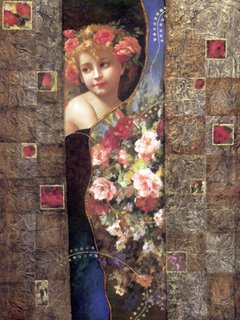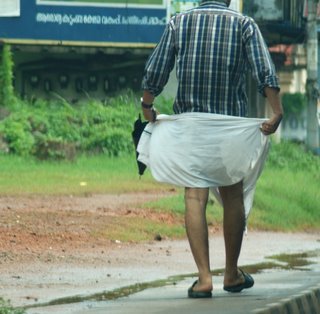ഓര്ക്കുന്നുവോ നീ
നമ്മളാദ്യം കണ്ട നിമിഷം

ജീവിത മാറാപ്പും
പേറി വര്ക്കുഷോപ്പിന്നോരം
പറ്റി നീ ഇരിക്കവേ
ചാരത്തണഞ്ഞൂ ഞാന്
ഒരു കുളിര്കാറ്റായ്
ഓര്ക്കുക "നമ്മുടെ കാര്യം
നാം തന്നെ നോക്കേണം".
എത്തി നീ പിന്നീടെന്
നൃത്തം കാണാന്,
വേദിയില് നിന്നു ഞാനാടി-
തളര്ന്നൊരാ ജീവിത വേഷം
അഴിക്കുവാനാകാതെ,
മറ്റൊരു നൊമ്പരമാകു -
മെന്നോര്മ്മയെ കെട്ടിപ്പിടിച്ചു
വിങ്ങി ഞാന് സിന്ഡ്രല.
ചൊന്നു നീ ഭ്രാന്തിയെന്നാ
ജനമധ്യേ, ചൊന്നു നീ
ഭ്രാന്തിന്റെ ഡോക്ടറെ കാണ്മാനും
കേവലം പേലവ ഹൃത്തടം
നൊന്തു പോയ്, സംഗതി
സീരിയസ് ആക്കണ്ട എന്നുരച്ചെങ്കിലും
തോന്നിപ്പോയ് "എന് നാട്യം
മാത്രമാണുത്തമം"എന്നൊരു പൂരുഷ
കേസരി തന്നഹംഭാവമോ?
മാറീല എന്നുള്ളില് നിന്നത്
സ്പഷ്ടമായി പിന്നെ വാക്കിലും നോക്കിലും
എത്തിപ്പോയ് അപരന്, എന്
മുഖഭാവങ്ങളൊക്കെയും ശൈശവ
ചാപല്യമെന്നുരച്ചീടവേ
നമ്മുടെ ഭാഷണം, അപരന്റെ
സംശയത്തിയറിക്കു തീവ്രത കൂട്ടിപോല്
എത്തി നീ കഥ അറിയാത്തൊരെന്
മുന്നിലായ്, ഭയന്നീടരുതി-
വരൊക്കെയും ക്ലോണുകള്
പിന്നെയും സംഭ്രമമായിരുന്നെന്നുള്ളി
ലെന്തിത് ഇവരെന്നോടിങ്ങനെ ചെയ്യുന്നു.
ഏവര്ക്കുമന്യ ഞാന് ഈ വേദിയിലാദ്യമായ്
നര്ത്തനം ചെയ്തു തളര്ന്ന കുമാരിത,
തേടി ഞാനോരോ ജനാലകളും തുറന്നാരോടാണി-
കഥ പറയേണ്ടതെന്നറിയാതെ
ഇല്ലൊരവസരമില്ല, പെഴ്സണല്
വിനിമയത്തിന്നറിയിപ്പൂ സംഘാടകര്
അത്ഭുതമിതെത്ര! ഒരു വഴി
മുന്നില് തെളിഞ്ഞു വന്നാവഴി
നിന് വീട്ടിലേക്കായിരുന്നു
പുഞ്ചിരി തൂകി എതിരേറ്റെന്നെ നീ
പട്ടു പുല്പ്പായ തന്നിരിപ്പിടവും
ചൊന്നിതു ഞാന് പരാതികളോരോന്നായ്
എന്തിതു ഇവരെന്നോടിങ്ങനെ ചെയ്യുന്നു?
അന്നു ഞാന് നിന് വീട്ടി-
ലെത്തിയ നാള് മുതല്
നിന്നോടു സൌഹൃദം പങ്കിട്ട നാള് മുതല്
എന്നും നീ എന് സുഹൃത്താണു
മറിച്ചൊന്നും ചിന്തിച്ചിട്ടില്ലിതേവരെ
പിന്നെയും വന്നവരൊട്ടു പേര്
അവരെന്റെ സ്വത്വത്തിനു
മാനത്തിനും വിലപേശീടവെ
കേവലം ഞാനൊരു കള്ളിയായ്,
കട്ടതെന് നിലീനത്തെയും.
പൊട്ടിച്ചിരിച്ചു നീചൊല്ലിയതോര്ക്കുന്നു
ശരിക്കൊന്നു ഞാന് കാണട്ടെ തമാശകളൊക്കെയും
വന്നവര് വന്നവര് എന്റെ സ്വത്വത്തെ തേടി
പിന്നെയും പിന്നെയും ചോദ്യങ്ങളുതിര്ക്കുന്നു.
ഉറങ്ങീലന്നാ രാത്രി, ജീവിത-
നൃത്ത്യമെത്ര ദുഷ്കരമാണെന്ന്-
ഓര്ത്തു കരഞ്ഞു ഞാന്
ചോദിച്ചൂ രാജുചേട്ടന്, ഫോണിന്നങ്ങേയറ്റം
ഞാഞ്ഞൂലിനെ കൊല്ലാന് ആറ്റം ബോംബിടേണമോ?
ആരെയും വേദനിപ്പിക്കുവാ-
നായിരുന്നില്ല ഞാന്
സീതായനം രചിച്ചതും നടനം ചെയ്തതും.
ഏകാകിയാമെന് ചെറുത്തുനില്പ്പിന്റെ
ഏകകം മാത്രമാണെന് സീതായനം.
ആരെയും വേദനിപ്പിക്കുവാ-
നുള്ളതല്ലെന് പാഠവും വിദ്യയും
അറിയാമതെനിക്കെന്നറിയ്ക നീ
പിന്നെയുമെത്തി അപരന് എന് പിന്നാലെ
ഉണ്ടൊരു ചോദ്യം സംശയത്തിയറി മേല്
ബോധ്യമായില്ലെനിക്കിന്നിതേവരെ
നീട്ടിവച്ചൂ മുന്നില് കടലാസിന് കഷണങ്ങള്
നമ്മുടെ ഭാഷണത്തിന്റെ ഭണ്ടാരക്കെട്ടുകള്
ഉത്തരം ഞാനവന്നേകി, ഉണ്ണീ ശ്രദ്ധിക്ക നീ
പാഠങ്ങള് വായിക്കുമ്പോള് അര്ത്ഥങ്ങള് പലതാണു
ഒന്നു മാത്രം നീ കണ്ടു,
അങ്ങനെ നിനച്ചു, ശീലിക്കയുണ്ണി,
വരികള്ക്കുള്ളിലര്ത്ഥം കാണാന്
നിനച്ചിരുന്നു, അറിയിക്കേണം നിന്നെയാ
സീതായനം നടനം ചെയ്യും മുമ്പെ
നിന്നെക്കുറിച്ചുള്ള പരാമര്ശവും
പിന്നെ കണ്ടതും കേട്ടതും
പ്രവര്ത്തിച്ചിരുന്നില്ലെന് പോസ്റ്റ് ബോക്സ്
അഗ്നിയെ കോട്ടയാക്കിയ പ്രോക്സിതന് കാരണം.
തുടങ്ങേണം പുതിയ പോസ്റ്റ് ബോക്സ്
എന്നിട്ടാകാമെന്നുറച്ചു ഞാന്
കഴിഞ്ഞില്ലിന്നേതേവരെ നാള്ക്കു നാള്
പ്രശ്നങ്ങള് കൂടിക്കൂടി വന്നതു കാരണം.
സീതായനം നടനം ചെയ്തതിന് ശേഷം
ഒന്നു സന്ദേഹിച്ചു, ഞാന് നിന്നെ ക്കുറിച്ചോര്ത്തു
കുറ്റപ്പെടുത്താമായിരുന്നില്ലേ എന് നടനത്തെ
വേണമായിരുന്നോ എന്നിലെ വ്യക്തിയെ.
അറിയുന്നൂ ഞാനെന് മുന്നില്
കൊട്ടിയടയ്ക്കപ്പെട്ടൊരാ വാതിലും
സ്നിഗ്ദ്ദ്ധമാം സുഹൃത്ബന്ധവും
നിന് മനമിത്ര ലോലമെന്നറിഞ്ഞീല ഞാന്.
മാപ്പു നല്കീടുക, വേണ്ടയീ
ചങ്ങാത്തം, ക്ഷമിക്കാനായില്ലെങ്കില്
നിന് വീട്ടുപടിയിന്മേല് മുട്ടില്ലൊരു നാളും.








